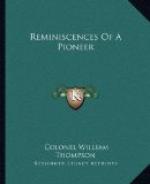As summer approached it became necessary to return to our wintering place, where a crop had been sown, and harvest the same. Accordingly, my father, accompanied by my two older brothers, the late Judge J. M. Thompson of Lane County, and Senator S. C. Thompson, Jr., of Wasco, then boys of 12 and 14 years, went back and cared for the grain. The wheat was cut with a cradle, bound into bundles and stacked. A piece of ground was then cleared, the grain laid down on the “tramping floor” and oxen driven around until the grain was all tramped out. After the grain was all “threshed out,” it was carried on top of a platform built of rails and poured out on a wagon sheet, trusting to the wind to separate the wheat kernels from the straw and chaff. By this primitive method the crop was harvested, threshed, cleaned, and then sacked. It was then hauled by ox teams to Albany where a small burr mill had been erected by a man named Monteith, if my memory serves me correctly, and then ground to flour.
And then, joy of joys! We had wheat bread. No more boiled wheat, nor flour ground in a coffee mill,—but genuine wheat bread. You, reader, who probably never ate a meal in your life without bread, have little conception of the deliciousness of a biscuit after the lapse of a year. As Captain Applegate once said to the writer, referring to the first wheat bread he ever remembered eating: “No delicacy,—no morsel of food ever eaten in after life tasted half so delicious as that bread.” It must be remembered that Captain Applegate crossed the plains in 1843 and was therefore an “old settler” when we arrived. His trials were prolonged only a matter of eight years; but looking back, what an eternity was emcompassed in those eight years.
One of the leading characteristics of the Anglo-Saxon is that on coming to the western hemisphere he brought with him his wife and children,— his school books, and his Bible. As soon, therefore, as a spot for a home had been selected and a rude shelter of logs erected for loved ones, the neighbors began discussing the question of school. It was finally arranged that we must have a school, and the cabin of a bachelor settler was tendered and accepted, and my father chosen as teacher. Logs were split open and placed on legs, with the flat sides turned up to serve as seats. The floor,—well, Mother Earth provided that. It was sprinkled and swept out with “split brooms” twice daily. To prevent the pupils getting lost in the tall grass of the prairies, furrows were plowed from the settlers’ cabins to the school house. This also served as a protection to the barefoot girls and boys going to and from, school. My father belonged to the old school and did not believe in “sparing the rod,” and as a result, it became indelibly impressed upon my juvenile mind that he used the rod upon me to better preserve order among the other pupils.




